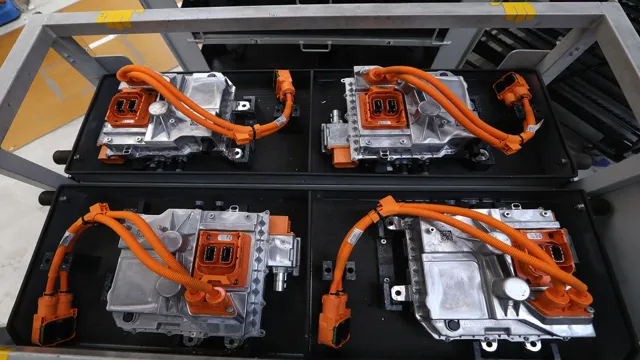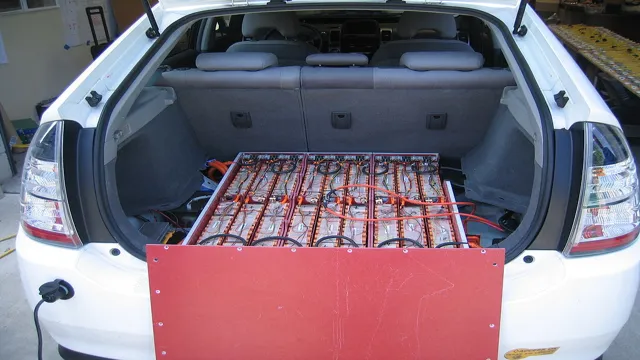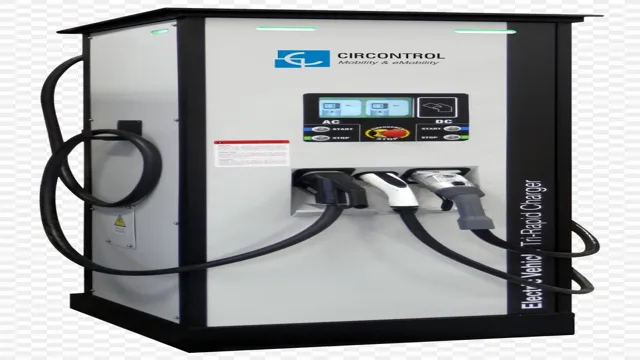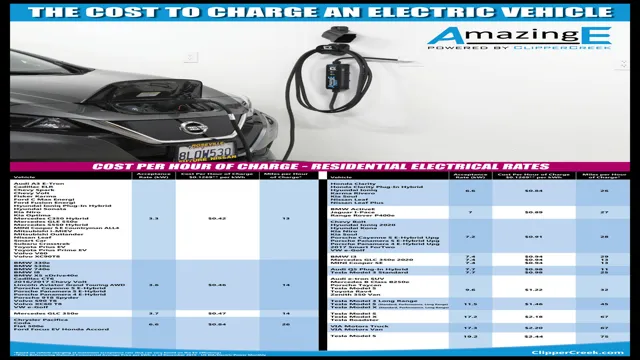Maximizing Your Electric Car’s Range: Choosing the Right Battery size for Optimum Performance
Electric cars have become a popular choice for many environmentally-conscious individuals who also desire cost-effective transportation. However, when it comes to electric cars, there is one important consideration that often gets overlooked: battery size. The battery size of an electric car can significantly affect its performance and overall cost, so it is crucial to understand how the battery size affects your driving experience.
In this article, we will explore everything you need to know about electric car battery size, including what it is, how it works, and how it affects the performance of your car. We will also discuss the different types of batteries available for electric vehicles, and what factors you should consider when choosing the right battery size for your needs. By the end of this article, you will have a comprehensive understanding of the importance of electric car battery size, and the impact it can have on your daily life.
So buckle up and get ready to delve into the world of electric car batteries – it’s sure to be an electrifying experience!
Why Battery Size Matters
When it comes to electric cars, the battery size really matters. It is the single most important factor that determines the range and performance of an EV. A larger battery means more stored energy, which translates to a longer driving range.
This becomes especially important for people who frequently drive long distances or possess a busy lifestyle that requires them to spend a lot of time on the road. With a larger battery, drivers can go for longer periods without having to stop and recharge. Furthermore, a bigger battery also provides better performance, allowing for quicker acceleration and stronger torque.
This is because a larger battery is capable of providing more power to the electric motor. It is also worth noting that battery technology is continuously improving, and the size of batteries is only going to increase with time. As far as charging is concerned, the larger battery will take longer to charge fully, but it will still give drivers more flexibility in terms of their charging habits.
In conclusion, the battery size for an electric car is crucial, and buyers should consider it carefully when choosing between different models.
Range and Performance
When it comes to electric vehicles, the size of the battery plays a crucial role in determining both the range and performance. In other words, the larger the battery, the more power it can provide to the motor, ultimately resulting in better acceleration and a longer driving range. It’s important to note that the range of an electric vehicle is directly related to its battery capacity, meaning that a larger battery can allow for greater distances to be traveled on a single charge.
Additionally, a larger battery can also provide more power to the motor, resulting in better acceleration and overall performance. Therefore, it’s important to consider the size of the battery when choosing an electric vehicle, especially if you’re looking for a vehicle with both good range and performance.

Cost and Charging Time
Cost and Charging Time: Why Battery Size Matters When it comes to buying an electric car, one of the top considerations is the size of the battery. And for good reason – the size of the battery plays a significant role in the cost and charging time of the vehicle. A larger battery will generally mean a higher cost for the electric car upfront, but it also means more range per charge.
This can translate to less frequent charging and more convenience overall. However, a larger battery can also mean longer charging times, especially if the charging infrastructure is not up to par. On the other hand, a smaller battery may be more affordable upfront, but it will likely require more frequent charging.
Ultimately, choosing the right battery size for your needs depends on your driving habits and priorities. Do you prioritize cost or convenience? Long range or quick charging times? Considering these factors can help you make the best decision for your electric vehicle purchase.
Factors that Affect Battery Size
When it comes to electric cars, battery size plays a crucial role. The bigger the battery, the longer the range and the more power the car can draw from it. However, battery size is determined by several factors, including the car’s weight, size, and performance requirements.
Additionally, the type of battery being used and the charging infrastructure available can also impact the size of the battery needed. For example, a car using a fast-charging network may require a smaller battery as it can be topped up quickly, whereas a car without access to a fast-charging network may require a larger battery to ensure adequate range. Ultimately, finding the right balance between range and cost is key, as larger batteries can significantly increase the cost of an electric car.
Nevertheless, with advancements in battery technology, electric cars are rapidly becoming more practical and affordable, and it won’t be long before larger batteries become the norm for electric vehicles.
Vehicle Type
When it comes to battery size in vehicles, there are several factors that come into play. One major factor is the type of vehicle. For example, electric cars will require much larger batteries than gas-powered vehicles.
This is because electric cars rely solely on their battery for power, while gas-powered cars have an engine that provides power to the battery as well as other systems. Additionally, larger vehicles, such as SUVs and trucks, will require larger batteries than smaller cars due to their heavier weight and increased power needs. Factors such as climate and driving habits can also impact battery size, as extreme temperatures and frequent stop-and-go driving can drain a battery more quickly.
Overall, battery size is a critical consideration for vehicle owners and manufacturers, as it directly impacts the performance and range of the vehicle.
Driving Habits
When it comes to electric vehicles, the size of the battery is a crucial factor that affects its performance. There are several driving habits that can impact the size of the battery required for optimal performance. For instance, frequent acceleration and sudden deceleration can lead to a higher energy demand, meaning that a larger battery is needed to sustain the vehicle’s power requirements.
Similarly, the speed at which you drive your electric vehicle can also impact the size of the battery. High speeds require more power, which in turn requires a larger battery to accommodate that power consumption. In addition, frequent use of energy-consuming features such as air conditioning and heating systems may also impact the battery size of your electric vehicle.
Overall, understanding how your driving habits affect your vehicle’s power demands is essential in selecting the right battery size to meet your specific needs.
Climate and Terrain
Climate and Terrain When it comes to electric vehicle (EV) batteries, there are several factors that can affect their size and performance. One of the most important factors to consider is the climate and terrain where the EV will be driven. In extremely hot or cold weather, battery capacity may be reduced due to temperature extremes.
Similarly, driving on hilly or mountainous terrain can also reduce range and require larger battery packs to compensate for the increased energy demands. However, in flatter or milder climates, a smaller battery pack may be sufficient for daily driving needs. In addition, the type of driving that the EV will be used for can also impact battery size.
For example, frequent highway driving at high speeds can drain battery life more quickly than stop-and-go city driving. Similarly, using features like air conditioning or heating can also impact battery performance. By taking into account these various factors, EV manufacturers can design battery packs that provide the ideal balance between range, performance, and cost.
Ultimately, climate and terrain are just one piece of the puzzle when it comes to determining the optimal battery size for an electric vehicle, but they are important considerations that must be taken into account.
Choosing the Right Battery Size
When it comes to electric cars, choosing the right battery size is essential. A larger battery size will give you more driving range, but it will also increase the cost of the vehicle. It’s important to consider your daily driving needs and the availability of charging stations in your area before choosing the battery size.
If you have a long commute or frequently take road trips, it may be worth investing in a larger battery to ensure you don’t run out of juice. On the other hand, if you mostly use your car for short trips and have access to charging stations, a smaller battery may be sufficient and more cost-effective. Ultimately, the battery size you choose will depend on your personal needs and preferences.
However, it’s important to keep in mind that larger batteries will also take longer to charge, so you’ll need to factor in charging time as well.
Evaluate Your Needs
To choose the right battery size, it’s crucial to evaluate your needs carefully. Before making any purchase, consider the device you want to power and for how long. A smaller capacity battery may be suitable for devices that consume less power, such as a remote control.
In contrast, high-power devices like a laptop, require a larger battery. Using a small battery in such power-hungry devices might mean frequent recharges, leading to inconvenience. Also, it’s worth checking the voltage requirement of your device since a battery with the wrong voltage might result in damaging your device.
Being mindful of your needs when choosing a battery size ensures optimal performance and longevity of your devices.
Consider Future Upgrades
Choosing the right battery size is crucial when considering future upgrades for your electronic devices. It’s important to think about what additional features or components you may want to add down the line and ensure that your battery can accommodate those changes. If you opt for a battery that’s too small, you may end up needing to replace it sooner than anticipated.
On the other hand, choosing a battery that’s too large can add unnecessary weight to your device and impact its portability. It’s all about finding the right balance. Think of it like buying a car – you don’t want a vehicle that’s too small and cramped for your needs, but you also don’t want a massive gas guzzler that’s difficult to maneuver.
By considering your future upgrades and selecting a battery that aligns with those plans, you’ll be setting yourself up for success in the long run.
Top Electric Cars with Impressive Battery Size
When it comes to electric cars, battery size is a crucial aspect to consider. The size of the battery determines the car’s range, performance, and price. Luckily, there are many electric cars with impressive battery sizes to choose from.
One such car is the Tesla Model S with a range of up to 600 kilometers on a single charge. The Porsche Taycan is another electric car with an impressive battery size, providing a range of up to 412 kilometers. The Audi E-Tron SUV can travel up to 328 kilometers on a single charge, making it a great option for those looking for a longer range.
The Ford Mustang Mach-E has a range of up to 483 kilometers, and the Chevrolet Bolt EV can travel up to 417 kilometers on a single charge. These electric cars prove that battery technology has come a long way and can provide excellent range and performance for electric vehicles. Whether you’re looking for a long-range option or an affordable electric car, there are plenty of options to choose from with impressive battery sizes that can meet your needs.
Conclusion
In conclusion, choosing the right battery size for your electric car is no small matter. It’s like trying to find a perfectly fitting shoe, except this time, you don’t want just any size—you want the one that fits like a glove and takes you the farthest. But worry not, dear driver, for when it comes to batteries, bigger is not always better, and smaller doesn’t necessarily mean inferior.
It all boils down to your driving needs, budget, and personal preference. So, if you want to go the extra mile (pun intended), do your research, crunch the numbers, and always stay charged up!”
FAQs
What is the average battery size for an electric car?
This can vary among different models, but the average is around 60 kWh.
Can I upgrade the battery size in my existing electric car?
It depends on the make and model of the car. Some manufacturers offer battery upgrade options, while others do not.
How long does it take to fully charge an electric car battery?
This also varies depending on the make and model, as well as the charging method used. On average, it can take anywhere from 4-8 hours for a full charge.
How often does the battery in an electric car need to be replaced?
Again, this can vary based on usage and the specific battery technology used. However, most electric car batteries are designed to last for at least 8-10 years before needing to be replaced.





